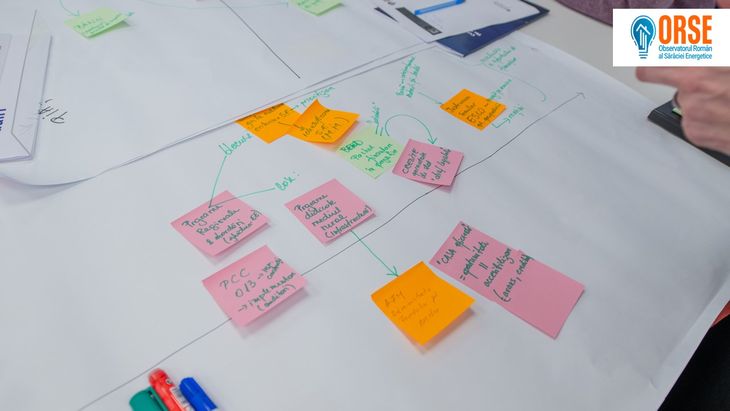Energy poverty is a complex phenomenon with multiple causes. There is no single solution or single actor that can propose solutions to deal with it, but sustained cooperation between all relevant actors in the field is needed. This is why the Romanian Observatory on Energy Poverty (ORSE) organized last week, at the European Commission Representation in Romania, the largest consultation of specialists from civil society and the energy market to assess policies to combat energy poverty in the country, on four main lines of action: energy efficiency, financial and non-financial solutions, market measures, new European instruments.
1. Energy efficiency in buildings: The quality of housing and home furnishings is considered a contributor to energy well-being. Inefficiently built and renovated dwellings, inappropriate use of equipment in the dwelling, as well as their inefficiency and technological wear and tear, can be the cause of high energy consumption, leading to unjustifiably high bills in relation to needs, making households vulnerable. Measures and programs aimed at making homes more efficient, and improving consumption behavior and equipment in the home are necessary..
The experts present considered issues such as: identifying the most important institutional actors targeting such measures; mapping the main actions worth considering, in particular, those underway in the coming period; the extent to which and how they can be improved.
2. Social aid and other non-financial opportunities: Social grants are an important tool in reducing energy poverty, especially as transitional measures. This means that they must have the effect of improving the situation of vulnerable people. In general, the social system in our country is characterized as rigid and limited, with few beneficiaries, a high degree of exclusion and significant bureaucratic hurdles in the application process, and the aid does not have the effect of lifting beneficiaries out of vulnerability. Moreover, market measures implemented mainly through cap-and-trade have a strong social aid flavor and are limited in their ability to generate change through market mechanisms.
Here, topics of discussion included: the perceived limitations in the way energy poverty is addressed by existing legislation and what could be changed; the most effective measures to address energy poverty (social, non-financial, market support); the actors needed in the decision-making process.
3. The energy market: In the European vision, the energy market is a dynamic environment involving three types of actors – private actors, public institutions and consumers. The concept implies a constructive relationship between actors to strengthen the energy market. In practice, the energy market in our country is a difficult collaboration between the three parties: regulation is one-sided, dialogue in decision-making is difficult, data exchange is hesitant, the consumer’s position is shaky, and there is little sense of participation in decision-making.
Specialists have analyzed aspects such as the main mechanisms that should be changed to transform the energy market into a dynamic and tripartite cooperative mechanism; decision-making models that can be implemented in the field of energy poverty / energy and society.
4. European programs and instruments to phase out polluting technologies, focusing on the extension of the carbon tax mechanism (ETS II) and the Social Climate Fund: CAn important part of the Fit for 55 package, ETS II aims to discourage the use of polluting fossil fuels for heating buildings and road transport. As this mechanism has the potential to reach in particularly vulnerable households dependent on these fuels for heating or mobility, this package also foresees the establishment of a special fund, the Social Climate Fund, for both short and long-term measures to address energy poverty and vulnerability (direct financial support schemes, measures to improve the thermal efficiency of buildings, measures to support public transport, etc.).
Member countries, including Romania, need to prepare their institutions to implement this new taxation mechanism and to redirect revenues to vulnerable households. In addition to the institutional architecture that needs to be prepared for these mechanisms, there is also a need for analysis to identify households at risk and targeted public policy proposals..
Topics of analysis on this theme included: who should be included in these complex decision-making processes; how do we prepare citizens for the new measures; who should be in charge of the public communication of programmes with an impact on both climate and social life.
“Elements of social policy, energy policy, fiscal policy are intertwined in describing and addressing energy poverty. This is why the European Commission’s approach to energy poverty is comprehensive, and energy poverty criteria have been included in more and more of our policies”, said Mara Roman-Bănescu, Deputy Head of the European Commission Representation in Romania, opening the event..
The “Energy and Society Agenda 2023” debate was attended by experts from fields relevant to energy poverty management, such as energy and climate policy, economics and taxation, energy production (electricity, oil & gas), renewable energy development, sustainable housing and cities, energy efficiency in buildings, environmental programs and green transition.
The debate “Energy and Society Agenda 2023”, organised by the Romanian Observatory on Energy Poverty, took place on Tuesday 31 January 2023. This wide-ranging expert consultation will produce a “roadmap” of the needs for action, the relevant specialists and actors in the field, as well as the governance and institutional modalities through which the necessary changes to alleviate energy poverty can be produced. Details can be found on the website of the Romanian Fuel Poverty Observatory at: https://saracie-energetica.ro/dezbaterea-agenda-energie-si-societate-2023/
About the Romanian Observatory on Energy Poverty
The Romanian Observatory on Energy Poverty (ORSE) is a project initiated by the Centre for the Study of Democracy, a think-tank established in 2006 within the Department of Political Sciences, Faculty of Political, Administrative and Communication Sciences, “Babeș-Bolyai” University of Cluj, where it operates as an accredited research centre..
